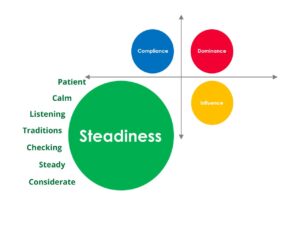Although synonymous with their use in recruitment, DISC Personality tests have a wide range of workplace applications. The DISC personality profiles’ adaptability makes it the secret weapon of thousands of organisations in cultivating a harmonious culture. The results are beneficial when organisations need to improve communication and collaboration as well as numerous other applications.
What are the specific areas DISC can apply to in the workplace, and how do we apply them?
How Does DISC Apply To The Workplace
From sales to team building and conflict resolution, there are numerous ways DISC can apply to the workplace. Here are some of the top ways businesses use DISC in the workplace.
DISC and Team Building
Businesses use Extended DISC® assessments across several workplace functions. One of the top applications of the DISC Personality test is team building. A team consists of people performing several tasks in a shared space while interacting with different behavioural styles. Knowing how the team members think, feel, and work makes it much easier to function effectively. Team profiling provides creative ways to coach employees, overcome conflict, and provide teams with tools to work well collaboratively. DISC Assessments can help better understand a team’s strengths and weaknesses and give a complete depiction of the team culture and the individual members.
Effective Communication
We spend most of our day interacting with various DISC personality types, at home and in the workplace. Excellent communication skills are essential to help communicate our message and achieve the desired outcome. An Extended DISC® communication assessment provides teams with an understanding of the different communication styles and their preferences. The DISC communication assessment also assists employees to understand their natural style and how they prefer to communicate. When teams become more aware of the diversity of communication preferences, they can adjust their style to others’ preferences to facilitate more productive communication. Effective communication skills contribute to an improvement in team performance and a decrease in conflict.
Improved Engagement
Employees that are sluggish, unmotivated, or unfocused, are usually experiencing a low level of engagement in their position. Insights from a DISC workplace profile provide managers and individuals with tips to cultivate an ideal environment that motivates them and reduces causes of workplace stress. The Extended DISC® assessment results help build a practical growth plan to ensure employees work to their natural behavioural strengths and the tasks that take the least energy and effort. The insights provide managers with actions to put in place in the employee’s environment to motivate them and delegate tasks accordingly. Extended DISC® Assessments work to transform individual performance and elevate overall team productivity.
Leadership Development
Extended DISC® Workplace Assessments help leaders develop the skills to lead effectively, drive results and enhance organisational performance. Extended DISC® assessments provide leaders with an understanding of their leadership style and how their employees perceive it. Through this understanding, leaders can work to their strengths and adapt their style to delegate tasks accordingly and communicate effectively with employees.
Recruit the Best Fit for your Organisation
Implementing Extended DISC® personality tests in the selection process can help recruiters determine the right fit when recruiting. Assessments can identify people with a natural behavioural match to the types of tasks required in a specific job position. Recruiters can use DISC workplace profiles to evaluate where there are behavioural gaps in the team. Recruiters can then hire to fill these gaps to ensure there is an array of behavioural styles to cover the team responsibilities. Extended DISC® Team Assessments help provide a range of different behavioural types to build a cohesive and forward-thinking group.
Using Extended DISC® personality assessments, recruitment managers and consultants gain information to help them make more accurate and confident hiring decisions. With the information obtained from DISC assessments, managers can ensure newly hired employees are more motivated and produce results quickly.
Would you like to discuss this topic more?
DISC Workplace Profile
A DISC Workplace Profile explores an individual’s natural behaviours, drivers, and preferences in a workplace setting. The profile provides you with information unique to you and your behavioural style. The DISC Workplace Profile encompasses how others see you, how you are motivated, and your strengths. It also provides focus areas for development. As well as how to work with others, communicate, and collaborate better.
At its core, your personalised DISC Workplace Profile is an in-depth exploration of how you tend to behave, react, and collaborate in a workplace setting. The DISC Workplace Profile includes:
- Overview of the DISC styles
- Your DISC style, DISC Diamond, and Flexibility zones
- Your motivators, demotivators, and stressors
- How you act in a team environment and your role within the team
- Your flexibility within competencies required across most roles and workplaces, including Time Management, Communication, and Management / Leadership
DISC Workplace Profile Assessment
The DISC Workplace Profile Assessment is a self-assessment that identifies a person’s unique DISC personality style. The workplace profile assessment consists of 24 questions in which a respondent picks adjectives that are most and least like them. The profile assessment takes 8-10 minutes to complete.
The resulting DISC workplace profile explores a persons’ natural behavioural style, including their drivers, motivators, strengths, and development areas. Workplace profiles provide specific and unique tips for individuals to support their development and enhance communication and leadership in the workplace. The DISC workplace profile also includes your flexibility within competencies needed across most roles and workplaces. Also included are your stress triggers and ways to reduce the causes of workplace stress.
Extended DISC® provides organisations with an easy-to-use framework to identify human behaviour. The tool supports individuals and businesses to improve relationships, communication, and critical aspects of business, such as management and sales.
DISC Workplace Test
The DISC workplace test provides New Zealand businesses with an easy-to-learn framework to better understand themselves and others. Employees with a thorough understanding of their natural behavioural preferences understand how to adjust their behaviour to create more effective interactions and become more successful in their role.
The Extended DISC® workplace test is an easy to administer online self-assessment to identify a person’s behavioural style. The personality profile encompasses 24 questions (48 sub-questions). It sounds simple, but it generates accurate and reliable insights into human behaviour. DISC workplace tests analyse a person’s natural behavioural style and how they prefer to interact with others. It’s the first step in professional development and cultivating more effective interactions.
Once a person completes the DISC workplace profile, our cloud-based system, FinxS, puts their answers into a uniquely generated report. The report describes a person naturally behaves in a workplace setting and provides easy to action development tips to increase workplace performance.
There are a variety of ways to apply the DISC personality test to the workplace. Extended DISC® Assessments do not require you to learn complicated evaluation terms or memorise seemingly endless combinations of variables. Once you understand your profile, you can learn to adjust your natural working style to nurture collaboration between team members. DISC workplace profiles provide an opportunity to help your team develop effective working relationships that positively impact corporate culture and productivity. If you want to enhance communication and collaboration in your organisation, Extended DISC® is a practical method to evaluate your culture.
Ready to use personality tests to strengthen your HR decisions?
Contact us today to explore Extended DISC® and other proven workplace assessments.




